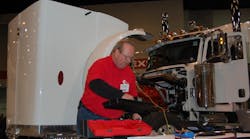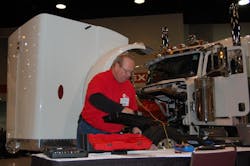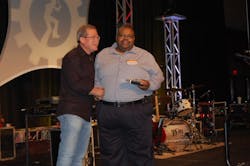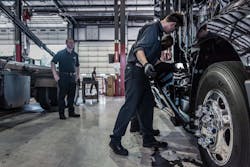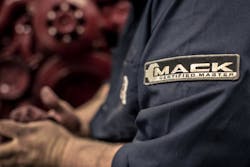“Most things in life that are worthwhile you’ve got to work at. You get out what you put in. It’s as simple as that. It’s kind of a universal law.” –James Hetfield, lead singer and rhythm guitarist for legendary heavy metal band Metallica.
No, I am not about to go on some wild tangent interlacing the intricacies of heavy metal music with the trucking industry (though that would be a LOT of fun, let me tell you …)
Yet Hetfield’s philosophy about life is hugely applicable to all sorts of endeavors, including the daily work that goes on in the trucking business. And it really jumped into focus for me as I talked to several winners at the 9th annual Rush Truck Centers (RTC) Technician Skills Rodeo in San Antonio TX this week.Take Randy Hughes (seen at right from an earlier RTC compeition) - a technician with 45 years in the trade under his belt. He started working at age 16 in his father’s truck repair business overhauling engines and told me that today 50% of the work he performs is done via computer - and that the pace of technological change where trucks are concerned shows no signs slowing down.
“Every system on a truck today works together with everything else – there are no longer ‘stand-alone’ systems,” he explained to me in his craggy Texarkana drawl. “As a result, you have to keep learning; the learning process never stops.”
Hughes added that even something small, such as the software controlling the antilock braking system (ABS) sensor array, can upend the proper functioning of other components if something goes wrong.Sylvester Chandler (on the right in the photo at left) is another long-time veteran technician who works out of RTC’s Dallas location. He pointed out to me that getting components to “talk” properly to one another is becoming a critical part of a technician’s job these days.
“Just re-flashing an engine with a software upgrade can lead to unexpected issues if you are not careful,” he stressed. “I recently dealt with a body upfit where the data link between the body and chassis caused that communication process to slow way down – and when you systems like the transmission can’t properly communicate with the engine or other components, they’ll return to their default settings which, in the transmission’s case, means shifting into neutral.”
Again, though, the “trick” to solving such problems is possession of a wide-ranging knowledge of the systems in question first. Then it becomes a game of detective, where the technician can hunt down and fix the issue based on the evidence he or she is receiving.
Hughes notes that is a skill that requires a lot of study – something he understands intimately. Originally a Caterpillar engine expert, over the years he’s added detailed knowledge of Cummins and Paccar MX engine technology to his repertoire – in fact winning first place in the Paccar MX category at this year’s skills competition, taking home $5,000 in total winnings.
(Chandler, by the way, won first place in the Eaton category, taking home $5,000 in total winnings as well).
Indeed, encouraging its technician corps to continually engage in training is one reason RTC started its annual skills rodeo – with the potential for big money and bragging rights no doubt major incentives for Rush’s technicians to keep upgrading their skills.Other companies within trucking also sponsor such competitions for similar reasons. For example, Mack Trucks launched its inaugural Mack Masters Competition this year with 991 dealership participants, making up 263 teams from 171 locations throughout the Mack dealer network.
Mack’s Masters Competition, unlike RTC’s, will use a “team format” with groups technicians working together to solve both questions and tasks instead of individually.
Teams in five regions – Canada, Central, Northeast, Southeast and West – will compete in two rounds of online challenges through March 2015.
Each of the three rounds preceding the hands-on competition is based on a theme – products, systems and diagnostics – and within each of those themed rounds are questions related to parts, service, warranty and technology.Five finalists – one team from each region – will be announced in April at the company’s Aftermarket & Soft Products Uptime conference in Dallas, TX, and will compete June 16 in a real-time hands-on competition the Mack Customer Care Center in Allentown, PA, to determine who takes home the first Mack Masters championship trophy.
“Challenging service and parts personnel to prove their mettle ultimately will improve their speed and accuracy, leading to reduced downtime and more satisfied customers,” noted Stephen Roy, Mack’s president of North American sales and marketing. “They have immense pride in what they do and are always looking for ways to be even better.”
And the pressure won't let up on the need for technicians to get better as trucks and all their related systems are only going to keep getting more complex in order to become more efficient on down the road.
